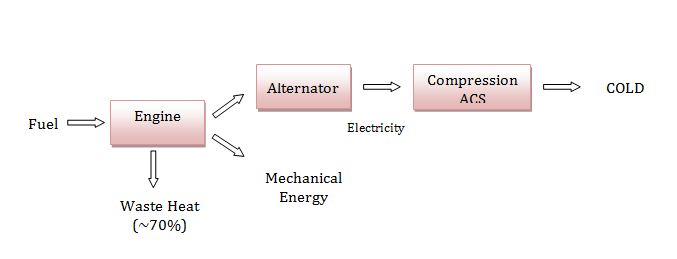Problems & needs
According to Global Industry Analysis Inc., refrigerated transportation world market will reach 5 billion € by 2015. Increasing awareness about food safety, consumer spending on high value perishable goods and replacement of refrigerated vehicles are driving the growth in refrigerated transportation market. Approximately 650.000 refrigerated road vehicles are currently in use within the EU.
The increase of fuel price is becoming a crucial aspect for cold transport companies, since the continuous growth of oil price is leading to a drastic increase of operative costs.
Refrigerated vans and trucks spend 10.000-90.000 liter of fuel/year and 8% about of this amount is due to refrigeration, today performed by compressor-driven Air Conditioning Systems (ACS) fed by the electricity generated by an alternator linked with the engine:

Most competing automotive air conditioners use an engine-mounted compressor, driven off of the crankshaft of the engine via a belt, with an evaporator in the car's trunk to deliver cold air through the rear parcel shelf and overhead vents. The compressor units is energy-consuming, and when it works, the vehicle consumption increases of 10-15% at least, as calculated by the project proposer COICAR.
The project here presented deals with the development of an innovative Sorption Heat Pump (S-HP), based on the adsorption/desorption of a gas stream (hydrogen) on solid beds and able to produce cold exploiting the waste heat generated by the thermal engine, according to the following layout:

By this technology, cold transportation companies could save 800 (2 m³ refrigerated vans) – 7.200 (90 m³ Rigid Semi-Trailer) fuel liter/years on average (1.200-10.800 €/year) for each van/truck, since the cold generation system is totally fed by the engine waste heat and the operating costs for refrigeration are completely avoided.
The refrigeration system to develop is a Metal Hydride Cooling System (MHCS) based on hydrogen adsorption/desorption on solid beds. Generally, each heat-driven air conditioning system can be applied to recover waste heat, but:
- focusing on the road transport refrigeration sector, requiring temperatures ≤ 4°C, all systems using water as working fluid are necessarily excluded since a temperature < 0°C is needed.
- Moreover, liquid sorption systems (NH3/H2O and LiBr) presents crucial operating drawbacks due to the presence of a liquid phase and to the specific weight (W/kg) and specific volume (W/l) unsuitable for a mobile application. For this reason, only solid sorption technologies have a real potentiality to be competitively applied in vehicles.
- Among sorption systems, MHCS constitutes the best technology in terms of compactness and Specific Cooling Power (SCP, i.e. the ratio between cooling power and system weight). Comparing MH technology with silica-gel heat pumps, the first has a SCP > 50 W/kg, while the second < 25 W/kg.
For these reasons, MH heat pump is the most promising technology to improve refrigeration efficiency and to develop a reliable and cost-competitive waste recovery ACS, leading to a revolution in the sector. But some crucial technological challenges have to be issued, mainly:
- developing qualified material systems for hydrogen adsorption/desorption beds, tailored for the specific application;
- characterizing and testing adsorption/desorption units;
- optimizing heat pump design, minimizing weight and volume of units (materials selection, optimization of energy flows).
